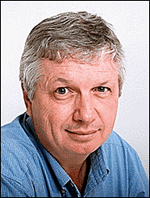


![]()
Talk Story
Diplomacy -- It isn’t just
for other countries anymoreAS national security adviser to George Bush the Elder when the Cold War ended, Gen. Brent Scowcroft coined the phrase "New World Order." He was military assistant to Richard Nixon and national security adviser to Gerald Ford, too.
Foreign policy is Scowcroft's schtick -- he even taught Russian History at West Point. His expertise -- dazzling to both the cognoscenti and mere spectators like me -- was on display this week here in Honolulu.
Scowcroft is chairman of the board of Pacific Forum, Center for Strategic and International Studies, a Honolulu-based foreign policy think tank. His insider's look at the state of international diplomacy has become the annual centerpiece at the organization's yearly dinner here.
The problem, Scowcroft told his audience of business and military leaders, consular corps, academics and news media, is that terrorism is difficult to define. One man's freedom fighter is another's terrorist.
We should be "careful but not overly fastidious" in picking new allies and friends in the battle against terrorism Scowcroft said. This will be a war of intelligence, not of military forces like World War I or II.
To get inside terrorist networks and destroy them we will need to go on the attack. "Homeland security -- defense -- won't work. Taking the offensive is essential."
To do that, we'll need the security and intelligence services of friendly nations to crack the communications of terrorist organizations. We'll need the cooperation of banks around the world to cut off their sources of funds, and we'll need to physically penetrate their networks, he said.
"We need people who look like terrorists, not like Americans. We need help and we're not used to being in this position," Scowcroft said. "Building a coalition is essential, but not easy."
Our allies have little in common except their opposition to terrorism, as each defines it. To sustain an alliance will require "exquisite diplomacy."
UNTIL now, "diplomacy has been seen as an act of charity" by Americans. We haven't taken it seriously; "we dip in and dip out according to our moods," Scowcroft said. Our new vulnerability has changed that.
"Hawaii is the only place in the U.S. that has felt conflict -- at Pearl Harbor in World War II. It always happened elsewhere." Sept. 11 changed all that. "We're now flying flags rather than burning them," Scowcroft said, and our national icon is the firefighter. "That's good -- good for the country."
Globalization may be the root problem, Scowcroft said. "This is not a religious conflict. It's far different." For the United States and other developed countries globalization is the promise of the future, but for most of the world "it is a whirlwind of bewildering change. We ask most people to do in a generation what it took the West a century to absorb," he said.
"In such an environment, terrorism thrives."
Our mission should be to help others find their way in an alien world. "We now need the world and the world desperately needs the leadership that only the U.S. can provide."
We have to start with al-Qaida, which everyone recognizes as a threat, Scowcroft said. Then, we can reach out further, perhaps to Sudan and Yemen, which should be encouraged by the way the United States has dealt with Afghanistan.
THERE is a heated debate inside the administration about whether Iraq should be next. "If we went after Iraq now, it would hurt the coalition," he said. "We need to think it through. Iraq isn't Afghanistan. It has nothing like the Northern Alliance. It's an entirely different problem."
Besides, going after Iraq would mean to lose the focus on al-Qaida and "we need to root it out" or it will grow again.
"The question now is will we stay the course, or will we say it's all over and return to our fun house view of foreign policy once we nab Osama bin Laden?"
It will be the president's job to keep the country motivated and on track. "If Osama is smart, he'll do nothing for a couple of years," Scowcroft said, since another attack would help us to maintain our focus.
"We're talking years before we can be confident that we've reduced the threat," Scowcroft said. "The U.S. role in the world can become great, but it's going to be very hard."
John Flanagan is the Star-Bulletin's contributing editor.
He can be reached at: jflanagan@starbulletin.com.